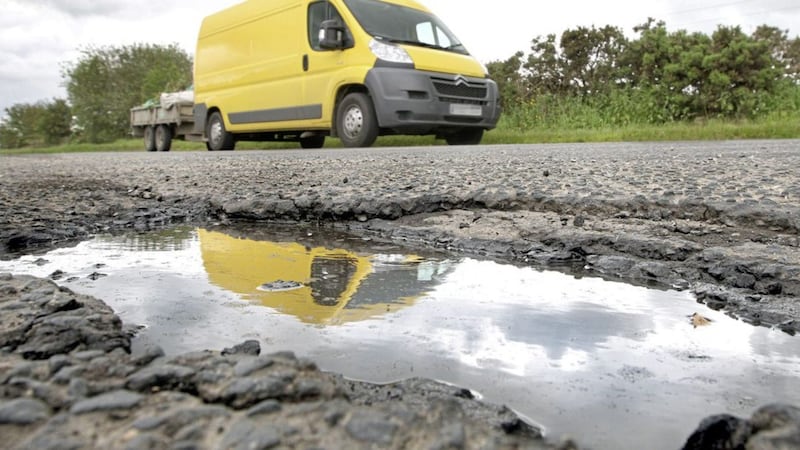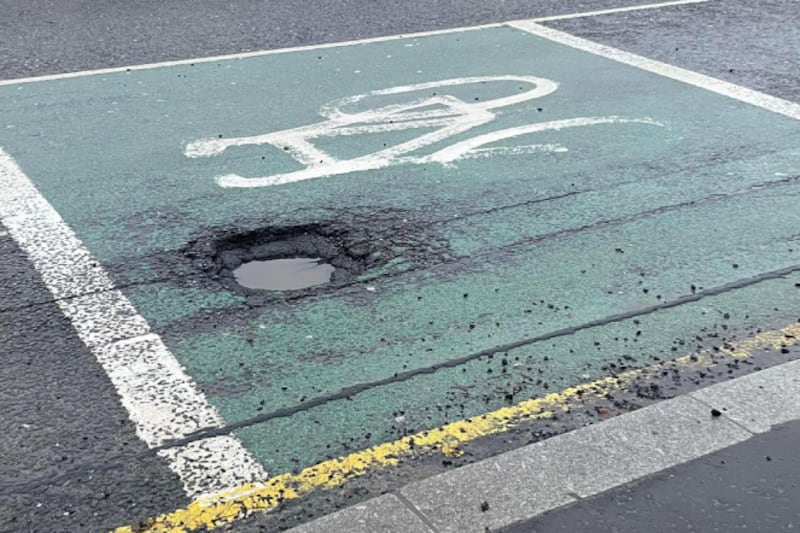POTHOLES in the north are officially getting deeper – because roads chiefs have doubled the depth they must be before workers fill them in.
The depth required before maintenance staff have to repair potholes in 'low-traffic rural roads' has been doubled to four inches.
There are fears the move could jeopardise road safety and lead to a surge in compensation claims from motorists at the taxpayers' expense.
It emerged yesterday that Stormont has paid out almost £500,000 in compensation over the past two years to drivers whose vehicles have been damaged by potholes and other road defects.
The north's roads have come under strain again in recent weeks due to heavy snowfall and icy conditions.
Roads officials say they have been facing a "challenging budgetary position for some time", but insist that public safety remains a priority.
The SDLP's Sinead Bradley learned of the changes to pothole repairs in a briefing with Stormont officials.
The South Down MLA expressed concerns that road safety could be impacted.
"There isn't a motorist in the north who hasn't had to traverse the pothole minefield that's gradually been getting worse as our roads infrastructure deteriorates," she said.
"As maintenance budgets fall in the absence of ministerial guidance, compensation claims are through the roof, bleeding resources that could be invested in infrastructure upgrades.
"The Department for Infrastructure has told me that they are now operating on a reduced maintenance service.
"What this means in practice for road users is that the depth for repairing potholes on roads with a lower traffic flow has doubled to four inches. That means cars will have to navigate ankle-deep craters before anything is done about it.
"There's a real issue of road safety here. If something isn't done, the potholes will get bigger and the compensation claims will increase."
A total of 1,935 vehicle damage claims were concluded between 2016 and November 30 last year, and £495,358.04 of compensation payments were made, according to a Freedom of Information response to the BBC.
Last year more than 78,000 surface defects were recorded on nearly 16,400 stretches of road.
The largest number of defects was 108 on a stretch from Summerhill-Cherry Road near Upper Dunmurry Lane on the outskirts of west Belfast.
This was followed by the Greenan Road outside Warrenpoint with 97 and Sixtowns Road near Magherafelt with 80.
The 2017/18 structural maintenance budget is £63m.
This is almost 30 per cent less than the £88m spent in 2016/17, but more than the £54m outturn in 2015/16.
The Department for Infrastructure (DfI) confirmed that on low-traffic rural roads, only potholes over four inches deep are currently being repaired.
A spokeswoman said public safety "remains a key priority" and that "despite the budgetary situation, the department has in this financial year delivered a significant programme of resurfacing".
"The department has been operating in a challenging budgetary position for some time and this has been having an impact on all road maintenance activities and the condition of the road network," she said.
"In addition, the recent winter weather has had an impact on the road network, with water ingress and freeze thaw action after heavy rainfall and cold snaps leading to the formation of more potholes.
"The highest priority potholes are currently being repaired and this includes, in many instances, defects up to 100mm [four inches] in depth. However, on low traffic rural roads only potholes over 100mm are currently being repaired."
The spokeswoman said there is a "balance to be struck" on its spending, adding: "Any decisions on budget allocation will be for a future Minister for Infrastructure.
"As always, and in particular during this period of bad weather we would encourage road users to be mindful of road conditions and adjust the way they drive, ride or cycle to ensure it is appropriate for the conditions."








